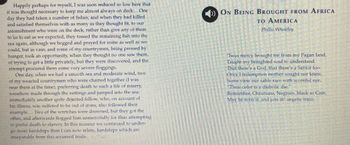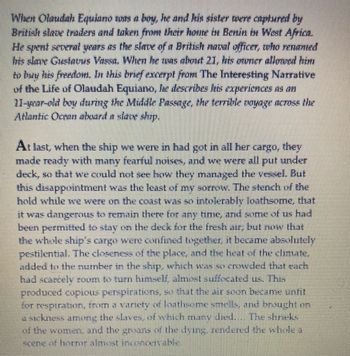Question
thumb_up100%
How did Equiano feel about slavery? Use at least 3 vivid sensory words he did to describe his situation.

Transcribed Image Text:### Transcription and Analysis for Educational Purposes
**Text from the Image:**
#### Left Panel:
The text recounts the harsh and inhumane conditions faced by enslaved individuals during transport. The narrator describes being kept mostly on deck due to ill-health, witnessing fellow captives being deprived of food, and severe punishments for attempting to survive the brutal journey. In one instance, two individuals chose to jump into the sea, preferring death over slavery. The crew's brutal response included flogging and chaining those who attempted escape.
#### Right Panel:
**On Being Brought from Africa to America - Phillis Wheatley**
This poem reflects on the speaker's journey from Africa to America. The speaker, identifying as having been enlightened by the experience, speaks of learning about Christianity. The poem acknowledges the disdain of some towards the African race but highlights the potential for redemption and inclusion in the Christian faith.
**Content Analysis:**
- **Theme of Inhumanity and Resilience:** The left panel emphasizes the cruel conditions endured by enslaved people and their resilience or desperation, depicting a stark image of life aboard slave ships.
- **Religious and Racial Reflection:** The poem by Phillis Wheatley explores themes of race, faith, and salvation. It discusses the perception of Africans by others and the transformative power of Christian belief, urging for an inclusive view within Christian doctrine.
This content provides a comparative look at historical narratives of enslavement alongside literary reflection, offering insight into both personal and collective experiences of African individuals during the transatlantic slave trade.

Transcribed Image Text:**Olaudah Equiano’s Experience on a Slave Ship: A Reflection**
When Olaudah Equiano was a boy, he and his sister were captured by British slave traders, taken from their home in Benin, West Africa. He became enslaved to a British naval officer who renamed him Gustavus Vassa. By age 21, Equiano was able to purchase his freedom. In his autobiography, *The Interesting Narrative of the Life of Olaudah Equiano*, he recounts his harrowing journey across the Atlantic Ocean on a slave ship, known as the Middle Passage.
**An Excerpt:**
Once the ship was fully loaded, Equiano and others were confined below deck, unable to see how the ship was managed. The conditions were far worse than he anticipated. The scent from the hold was unbearable, and being constantly confined made it dangerous to stay there. Although some were allowed on deck for fresh air initially, space constraints forced everyone back below.
The tight proximity, combined with the oppressive climate and overpopulation, made the air foul and stifling. Many suffocated, unable to move or breathe freely. The oppressive heat and lack of ventilation led to many developing illnesses, resulting in numerous deaths. Equiano vividly describes the groans of the dying, an indication of the severe distress and harsh realities faced by those aboard the ship.
This narrative offers insight into the horrific conditions of the transatlantic slave trade and the strength of those who endured it.
Expert Solution
This question has been solved!
Explore an expertly crafted, step-by-step solution for a thorough understanding of key concepts.
This is a popular solution
Trending nowThis is a popular solution!
Step by stepSolved in 2 steps
